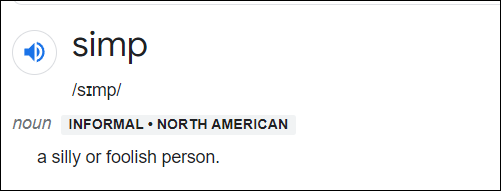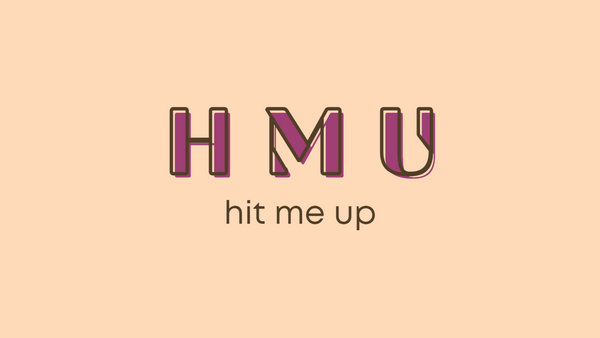The presumable short form for ‘simpleton’ that became a viral trend during 2019 and 2020 has older and deeper roots with multiple levels of evolution, or rather devolution. ‘Simp’ may have been all over the internet during the mentioned time frame, but it was alive and kicking all in the wrong direction for way longer.
From being an abbreviation to a merge of viral slangs in the 90s and to becoming a banned slang, ‘Simp’ has come a long way. This slang, used in popular rap lyrics came to earn a sexist name in the 2000s. Ever since it’s been in bad books of those who oppose this ridiculous ‘simpery’ and clings onto those who actively promote it.
The Origins of ‘Simp’
No, it didn’t begin with The Simpsons.

The seed of this morally questionable yet downwardly dynamic slang was planted way back in the 1600s. It was the time ‘Simpleton’ was coined and the beginning of a rollercoaster of a journey for its eventual short-form. ‘Simp’ was, as a factual matter of its presumption, an abbreviation of the then famous ‘Simpleton’.
The earliest record of using ‘simp’ as a short-form was during the early 1900s (circa 1903). This earns the present-day perception that ‘Simp’ may only mean a foolish person. Some users also apply it in that sense to this day. Nevertheless, viral and vile internet definitions of the slang overpower its rather harmless use-case as an abbreviation.
Simp’s Journey Through Time
After its moderately acceptable intent and vocabulary purpose at the start, the same ‘simp’ came to be applied as an insult during the 80s and 90s. It stood out as a trending slang in the Black hip-hop culture of the time. Gradually, Simpleton’s abbreviation began growing in meaning — a vibrant, diverse, and awfully offensive range of meaning.
During the early 2000s (circa 2000-2010), ‘Simp’ was presented and used as an amalgam of two words – sissy and pimp. Up until now, ‘Simp’ described a man who was overly attentive to women and submissive to them. Post-2010 (approximately 2013), ‘Simp’ was an excessively emotional man.
The most recent turn of events for ‘simp’ was that it became an acronym in 2019 — (Suckers Idiolizing Mediocre P*ssy). Many other explicit and distasteful expansions began to follow. At every milestone, ‘simp’ was always used as an insult towards men with qualities besides or other than the patriarchal and misogynistic checklist.
What Does Simp Mean Anyway?
Simp, in the current day and age, has tons of different definitions. There are numerous premises for the slang. Spinelessness, male ego, toxic masculinity, sexual and non-sexual submission (mostly by men towards women), going out of one’s way to impress, female attention-seeking males, are some of the more popular themes behind the slang.
A simp, in the broader and more viral sense, is a man who:
- Showers his woman with attention, love, and care. Places her needs above his.
- Relentlessly pursues a woman even after being rejected.
- Compliments women.
- Lets women walk all over him.
- Unconditionally provides for a woman even when she doesn’t treat him well.
- Is a sugar daddy.
- Puts women (hoes) before his friends (bros).
- Is spineless.
- Supports his partner in public.
- Undervalues himself and tries way too hard to impress romantically.
- Is nice to women — in any way.
- Is desperate for female attention.
- Is overly attentive to women.
- Expects instant romantic interest regardless of personal likes and dislikes.
Why Was ‘Simp’ Popular and Controversial?

‘Simp’ was out of the radar of viral trends until 2019 and 2020. The slang made a comeback on TikTok, Twitch, and a bunch of other social media platforms. It was not only becoming a famous and ‘trending’ slang but it was also the coming of age of gender toxicity on digital platforms.
This adolescent-fuelled slang with a supposedly comic foundation was seen everywhere on the internet when it blew out as a trend. Comments, captions, even text messages had the insult of being a simp, practicing ‘simping’ (the verb form of being a simp), or about someone’s simpery becoming a regular affair.
When it first came out, it wasn’t much of a big deal, but as the remark stayed in the internet vocab, it began birthing several obnoxious meanings and uses. In order to avoid being labeled a simp, men had to be as mean, rude, and insensitive to women. If they were found to be nice or simply civil towards women, they got the notorious title.
Much like many internet trends, ‘simp’ too got to the point it was walking on very thin ice. This internet slang also began portraying men as ‘effeminate’ or ‘unmanly’ because they did not adhere to the primitive bracket of what it means to be a man. The more patriarchal a man, the lesser the simp he is. If a man likes a woman, stands up for women, does things for women, and associates with femininity in any way, he is a simp!
Banning Simp on Twitch
‘Simp’ may not be banned on many (or any) social media platforms, but Twitch took a stand in 2020. The slang went from being an insult directed towards men who are sensitive, gentle, and dignified towards women to becoming a crowd-outburst against men who were simply watching, following, or donating to female streamers.
Twitch recognized this poison on the platform and banned the usage of ‘Simp’ on the 16th of December, 2020, along with ‘virgin’ and ‘incel’. This internet culture of shaming men just for being nice and supportive towards women began imploding on the streaming platform. Apart from a man ‘simping’, the supposed ‘simpery’ was also damaging a female streamer’s presence on Twitch and therefore, her career as well.
Twitch’s ban on the slang is predominantly for degrading use-cases. That is if ‘simp’ is not used as a slur, then maybe, it can be allowed. But, given its current etymology as a scathing slang that unfairly targets men, that is nearly impossible. Moderators now have the added task of staying vigilant against the usage of the derogatory ‘simp’ on Twitch.
The Internet’s Types of Simps
Based on how the slang is used online, there are two major classifications of a simp. The one who values themselves and shares the same with the opposite sex and the one who ignores their value and lends it all to the opposite sex. It’s unfortunate that even healthy, two-way love and care between a man and his woman is also, at times, labeled simping.
More often than not, the second type is the more popular understanding of a simp. But, it’s the internet, and well, everything is possible.
The first category of so-called “simps” essentially contains men who believe in chivalry but aren’t necessarily chivalrous. They may not hold the door for their woman, but they hold her hand in public. They support, encourage, and stand by women. They may also be feminists. Sometimes, they may go out of their way to show their love to their woman.
The second and prevalent category of a simp lacks self-esteem. They let the opposite sex use them in hopes to gain sexual or romantic attention, favors, or simply an identity. This type of a simp supports, encourages, and compliments women in order to be liked by them, for sex, or companionship. Sadly, they get none of it in return.
These are just broad categories of a simp, they are niche types that can fall under either as well. Here are a few:
- The social media simp – Someone who randomly DMs (directly messages) women hoping to get some virtual or physical action.
- The sugar daddy
- The funder – Someone who goes over the top to give women money and fund their vanity. They overspend on women.
- The chivalrous – A gentleman can be called a simp simply because of his chivalrous nature. If he likes to do things for women without expectation, then, he’s a simp.
- The entitled – If a man does the bare minimum for a woman and immediately expects her to like/date/sleep with him, he’s a simp. Or, if a man goes over the moon for a woman who still rejects him, and he doesn’t learn, then too, he’s a simp.
There are many more definitions of simpery. These definitions get as individualistic as they come. Many times, people who use the slang online and offline, don’t really know its original meaning and use it in its trickled essence — like Chinese whispers. This is how there is an endless list of meanings and intents behind ‘simp’.
Analysis

Throughout the article, you’ve read that ‘simp’ is a masculine personality trait — a socially unacceptable one, that too. However, it is also used by and for women and other genders, but disproportionately. Men in real life and online, are the common victims of this word, nonetheless. A person can also be branded ‘simp’ for being “too” nice to someone they love or care about.
The internet digs deeper into gender toxicity on one end and also paradoxically tries to get rid of it on the other. Being a flagbearer of cognitive revolution that can potentially change the way we think overnight, the internet can drive positive or negative change. While there are movements supporting gender equality, feminism, the LGBTQ community, and movements against toxic masculinity, patriarchy, and misogyny, we find sub-cultures like simp that hurt all the progress we’re trying to make.
‘Simp’ is a teenager’s, to be precise, a teenage boy’s insult towards boys or men who are kind and nice to women. In the face of the gender-positive content and culture that most of the world is trying to bring about, adolescent slangs like ‘simp’ are not just negative but they also negatively speak volumes of a bigger problem — a damaged and damaging teenage mindset. If teenage boys are coming together to bully other boys who are nice to girls, then, the problem is not the slang.
Today, ‘simp’ is not just used by boys, but grown men and women alike. It’s supposed to be a light-hearted and humorous dialect that is sadly not as harmlessly received as users expect it to be. Simp is the epitome of toxic masculinity, a branch of cyberbullying, gender bullying, and most importantly, it defines an age where we are okay with all of it. It works deeper into problems like patriarchy and misogyny — and many are loving it.
Conclusion
‘Simping’ or ‘simpery’ is essentially a tragic one-sided story of love, respect, admiration, or inspiration. But, there are so many more exhaustive sides to the slang. ‘Simp’ normalizes hurt, self-deprecation, and losing one’s self-respect while exalting another person. At its roots, a simp is basically a foolish person who’s also a hopeless romantic.
This means we’re encouraging people (and teens, especially) to give and continue giving and expect nothing, including respect, in return. Education must be at the core of demolishing such outrageous slang, not entertainment. As viral as the slang is, it also talks of how generic and normalized sexually demeaning content is, in the world today.
Just because it sells, doesn’t mean we should buy it.










Member discussion